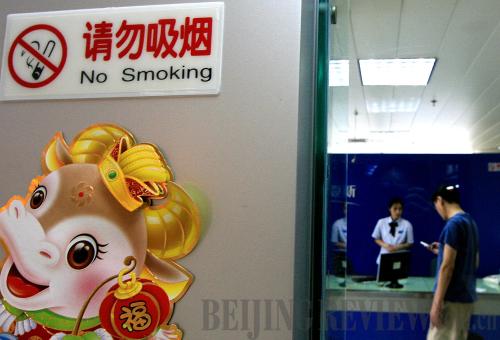|
 |
|
WILL IT WORK? How to make smoking control regulations effective is a big challenge for Shanghai due to passive smokers' reluctance to become involved. Pictured is a "No Smoking" sign posted in a household electrical appliances market in Shanghai (XINHUA) |
Nonsensical Statistics
Some of China's provinces are richer than world's major economies, says a report recently released by the Chinese Academy of Social Sciences. South China's Guangdong Province, for example, topped three Group of 20 countries, namely Saudi Arabia, Argentina and South Africa, in terms of overall gross domestic product (GDP) in 2008.
But the economic aggregate of an economy does not fully show the wealth level of its people. In per-capita terms, obviously, even residents in China's developed provinces fall far behind many foreigners.
More importantly, China still has a long way to go before it catches up with developed economies in areas such as social security guarantees, wealth distribution mechanism, public services and so on.
In recent years, how to enable ordinary people to share growth achievements has become a hot topic in China.
Unless it's balanced development, a comparison of GDP figures of China's rich provinces and major economies around the world is nothing but showing off.
China Youth Daily
Putting People First
Since last summer, residents in Dazu County, southwest China's Chongqing, have begun to complain that their drinking water smells fishy. But now the 90,000 or so residents have been drinking it for more than half a year.
The local epidemic prevention agency recently said that although the water did not meet state quality standards, if the smell was the result of algae spreading, drinking the water would do no harm.
This explanation is undoubtedly paradoxical. Since the water is below standard, it must be undrinkable, so why say "to drink it is harmless?"
Most of local residents live on low or middle incomes, and for them to buy purified water day after day is almost impossible. All they can do is to throw alum into the water to purify it. The reason why the problem was not addressed instantly may be that those affected are everyday people who have no privilege or power. In a fair society, even if the poor only account for a small proportion of the whole population, their rights should not be neglected.
Qianjiang Evening News
Down on Disease
February 28 marks the World Rare Disease Day. On that day, the Ministry of Civil Affairs announced that medical expenses for serious diseases—including rare diseases—would be covered by the state's charity funds by the end of this year.
Rare diseases refer to the uncommon ones, which are chronic, debilitating, progressive, degenerative, and often life-threatening. The World Health Organization estimates rare diseases affect 0.65-1 percent of patients out of the world's total population. Today, there are 5,000-6,000 kinds of rare diseases, accounting for 10 percent of total human diseases. At this percentage, China may have more than 10 million patients suffering from rare diseases.
But, because of paying less attention to rare diseases, the country is still in a primary stage of their research and treatment. Worse still, there is not an effective financial support system for patients. How to set up a mechanism to guarantee long-term therapy for them is an urgent task.
The state's charity funds' coverage of medical expenses for rare diseases will relieve economic pressure on patients and improve their quality of life. Besides, it will also increase public awareness of respect for the lives and health rights of rare disease patients.
Xinmin Evening News
Stopping Smoking
The Shanghai Regulations on Smoking Control in Public Places took effect on March 1. Smoking have been banned in the city's kindergartens, schools, hospitals, stadiums, public service areas, shopping malls, libraries, theaters and museums, among other places, and violators will be fined.
But the public and media are not optimistic about the implementation of the regulations.
To make the regulations really effective, basic power comes from passive smokers. The aim of the regulations is to protect their health rights, and passive smokers in turn, it is hoped, will take action to safeguard those rights by applying the regulations.
But few non-smokers are ready to stand up to fight against smoking because they are not confident about stopping the smokers. They understand the power of individuals is limited.
If they can form nongovernmental organizations, the situation will change. I believe many individuals, including non-smokers and passive smokers, will actively participate in organized fight against smoking.
To this end, when legal powers do not cover all public places, nongovernmental organizations will be an effective power in fighting against smoking.
Shanghai Morning Post | 